1. Overview
Upgrading Maven dependencies manually has always been a tedious work, especially in projects with a lot of libraries releasing frequently.
In this tutorial, we’ll learn how to exploit the Versions Maven Plugin to keep our dependencies up-to-date.
Above all, this can be extremely useful when implementing Continuous Integration pipelines that automatically upgrade the dependencies, test that everything still works properly, and commit or rollback the result, whichever is appropriate.
2. Maven Version Range Syntax
Back in the Maven2 days, developers could specify version ranges within which the artifacts would’ve been upgraded without the need of a manual intervention.
This syntax is still valid, used in several projects out there and is hence worth knowing:
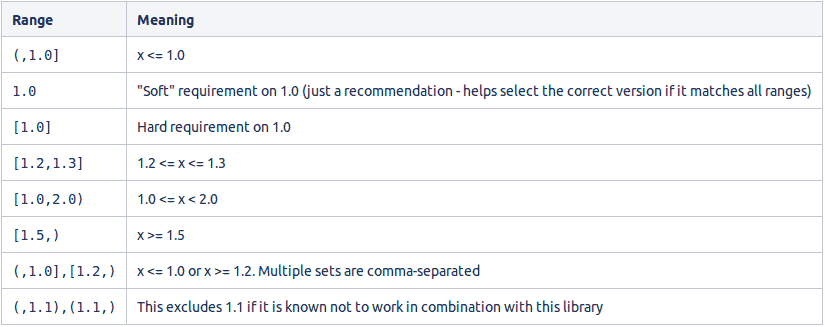
Nonetheless, we should avoid it in favor of the Versions Maven Plugin when possible, because advancing concrete versions from the outside gives us definitely more control than letting Maven handle the whole operation on its own.
2.1. Deprecated Syntax
Maven2 also provided two special metaversion values to achieve the result: LATEST and RELEASE.
However, this legacy upgrade method was causing unpredictability where CI needed reproducibility. Hence, they’ve been deprecated and completely removed in Maven3:
For the sake of reproducible builds, Maven 3.x no longer supports usage of these metaversions in the POM
3. Versions Maven Plugin
The Versions Maven Plugin is the de facto standard way to handle versions management nowadays.
From high-level comparisons between remote repositories up to low-level timestamp-locking for SNAPSHOT versions, its massive list of goals allows us to take care of every aspect of our projects involving dependencies.
While many of them are out of the scope of this tutorial, let’s take a closer look at the ones that will help us in the upgrade process.
3.1. The Test Case
Before starting, let’s define our test case:
- three RELEASEs with a hard-coded version
- one RELEASE with a property version, and
- one SNAPSHOT
<dependencies>
<dependency>
<groupId>commons-io</groupId>
<artifactId>commons-io</artifactId>
<version>2.3</version>
</dependency>
<dependency>
<groupId>org.apache.commons</groupId>
<artifactId>commons-collections4</artifactId>
<version>4.0</version>
</dependency>
<dependency>
<groupId>org.apache.commons</groupId>
<artifactId>commons-lang3</artifactId>
<version>3.0</version>
</dependency>
<dependency>
<groupId>org.apache.commons</groupId>
<artifactId>commons-compress</artifactId>
<version>${commons-compress-version}</version>
</dependency>
<dependency>
<groupId>commons-beanutils</groupId>
<artifactId>commons-beanutils</artifactId>
<version>1.9.1-SNAPSHOT</version>
</dependency>
</dependencies>
<properties>
<commons-compress-version>1.15</commons-compress-version>
</properties>
Finally, let’s also exclude an artifact from the process when defining the plugin:
<build>
<plugins>
<plugin>
<groupId>org.codehaus.mojo</groupId>
<artifactId>versions-maven-plugin</artifactId>
<version>2.7</version>
<configuration>
<excludes>
<exclude>org.apache.commons:commons-collections4</exclude>
</excludes>
</configuration>
</plugin>
</plugins>
</build>
4. Displaying Available Updates
First of all, to simply know if and how we can update our project, the right tool for the job is versions:display-dependency-updates:
mvn versions:display-dependency-updates
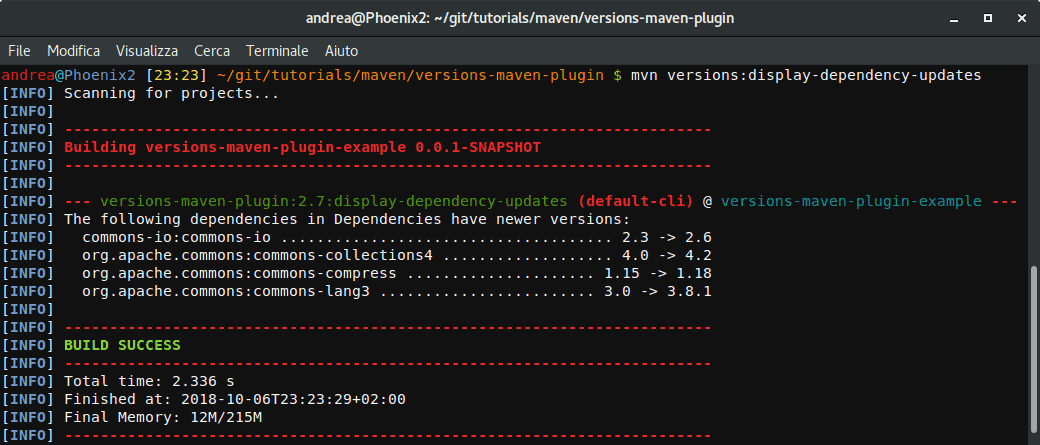
As we can see, the process included every RELEASE version. It even included commons-collections4 since the exclusion in the configuration refers to the update process, and not to the discovery one.
In contrast, it ignored the SNAPSHOT, for the reason that it’s a development version which is often not safe to update automatically.
5. Updating the Dependencies
When running an update for the first time, the plugin creates a backup of the pom.xml named pom.xml.versionsBackup.
While every iteration will alter the pom.xml, the backup file will preserve the original state of the project up to the moment the user will commit (through mvn versions:commit) or revert (through mvn versions:revert) the whole process.
5.1. Converting SNAPSHOTs into RELEASEs
It happens sometimes that a project includes a SNAPSHOT (a version which is still under heavy development).
We can use versions:use-releases to check if the correspondent RELEASE has been published, and even more to convert our SNAPSHOT into that RELEASE at the same time:
mvn versions:use-releases
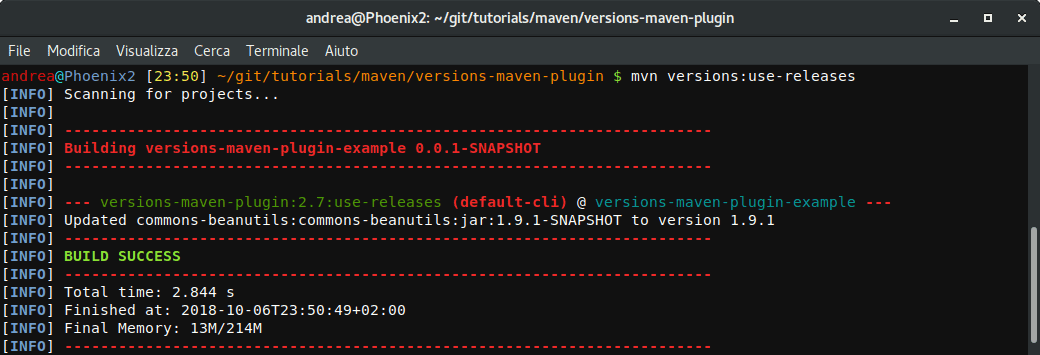
5.2. Updating to the Next RELEASE
We can port every non-SNAPSHOT dependency to its nearest version with versions:use-next-releases:
mvn versions:use-next-releases
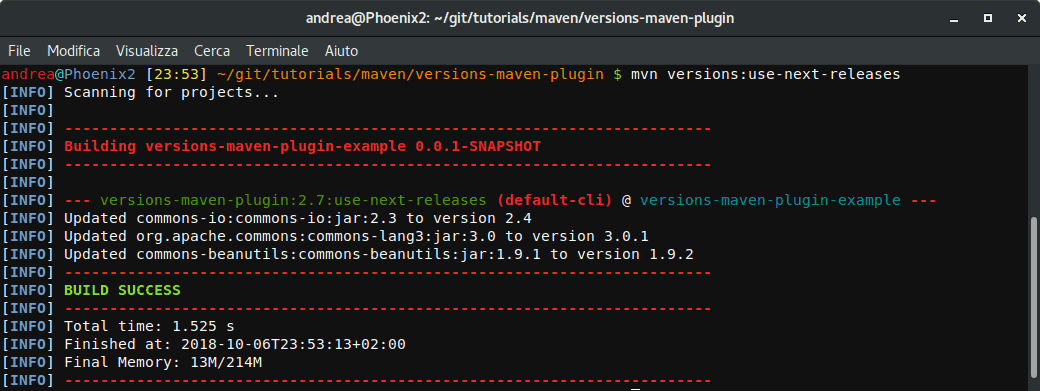
We can clearly see that the plugin updated commons-io, commons-lang3, and even commons-beanutils, which is not a SNAPSHOT anymore, to their next version.
Most importantly, it ignored commons-collections4, which is excluded in the plugin configuration, and commons-compress, which has a version number specified dynamically through a property.
5.3. Updating to the Latest RELEASE
Updating every non-SNAPSHOT dependency to its latest release works in the same way, simply changing the goal to versions:use-latest-releases:
mvn versions:use-latest-releases
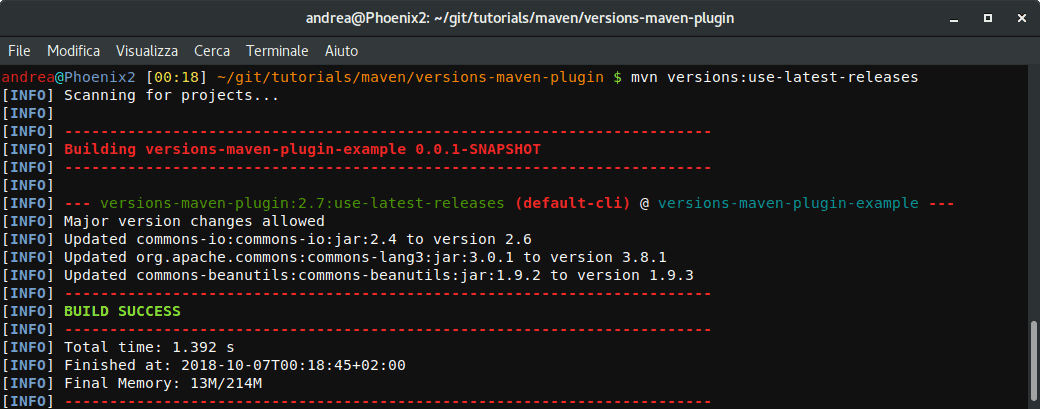
6. Filtering Out Unwanted Versions
In case we want to ignore certain versions, the plugin configuration can be tuned to dynamically load rules from an external file:
<plugin>
<groupId>org.codehaus.mojo</groupId>
<artifactId>versions-maven-plugin</artifactId>
<version>2.7</version>
<configuration>
<rulesUri>http://www.mycompany.com/maven-version-rules.xml</rulesUri>
</configuration>
</plugin>
Most noteworthy, <rulesUri> can also refer to a local file:
<rulesUri>file:///home/andrea/maven-version-rules.xml</rulesUri>
6.1. Ignoring Versions Globally
We can configure our rules file so that it’ll ignore versions matching a specific Regular Expression:
<ruleset comparisonMethod="maven"
xmlns="http://mojo.codehaus.org/versions-maven-plugin/rule/2.0.0"
xmlns:xsi="http://www.w3.org/2001/XMLSchema-instance"
xsi:schemaLocation="http://mojo.codehaus.org/versions-maven-plugin/rule/2.0.0
http://mojo.codehaus.org/versions-maven-plugin/xsd/rule-2.0.0.xsd">
<ignoreVersions>
<ignoreVersion type="regex">.*-beta</ignoreVersion>
</ignoreVersions>
</ruleset>
6.2. Ignoring Versions on a Per-Rule Basis
Finally, in case our needs are more specific, we can build a set of rules instead:
<ruleset comparisonMethod="maven"
xmlns="http://mojo.codehaus.org/versions-maven-plugin/rule/2.0.0"
xmlns:xsi="http://www.w3.org/2001/XMLSchema-instance"
xsi:schemaLocation="http://mojo.codehaus.org/versions-maven-plugin/rule/2.0.0
http://mojo.codehaus.org/versions-maven-plugin/xsd/rule-2.0.0.xsd">
<rules>
<rule groupId="com.mycompany.maven" comparisonMethod="maven">
<ignoreVersions>
<ignoreVersion type="regex">.*-RELEASE</ignoreVersion>
<ignoreVersion>2.1.0</ignoreVersion>
</ignoreVersions>
</rule>
</rules>
</ruleset>
7. Conclusion
We’ve seen how to check and update the dependencies of a project in a safe, automatic, and Maven3-compliant way.
As always, the source code is available over on GitHub, along with a script to help showcase everything step-by-step and without complexity.
To see it in action, simply download the project and run in a terminal (or in Git Bash if using Windows):
./run-the-demo.sh